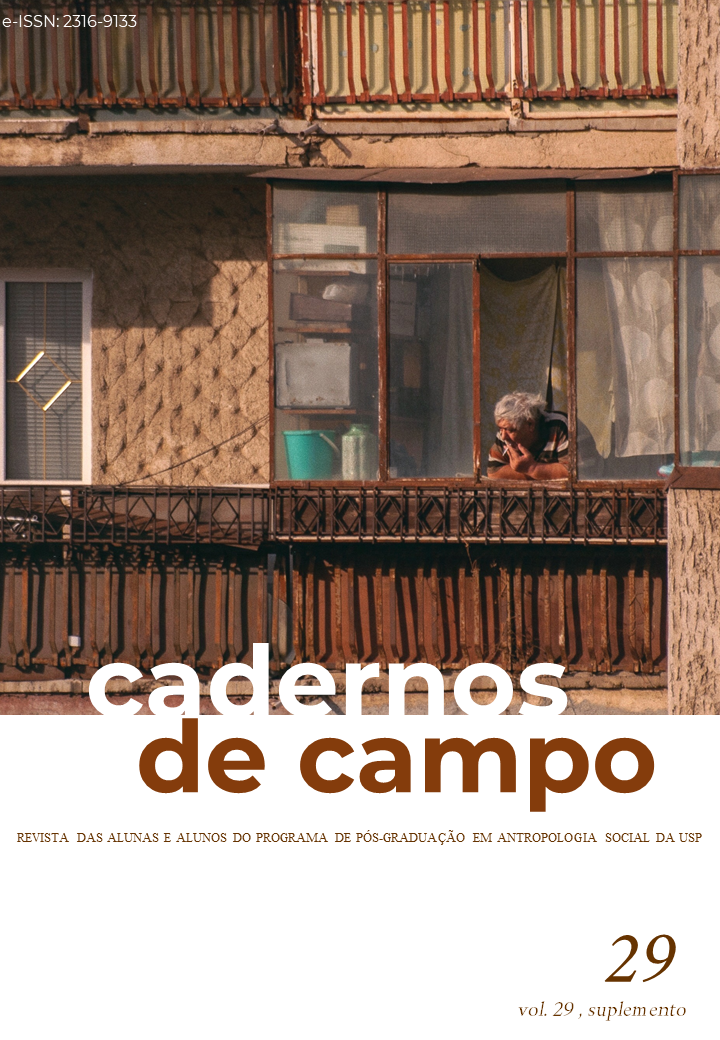Ethnographic experiments on networks and balconies
religion in pandemic times
DOI:
https://doi.org/10.11606/issn.2316-9133.v29isuplp289-301Keywords:
Religion, Covid-19, Brazil, social media, domestic spacesAbstract
Focusing on ethnographic experiments related to religion in Covid-19 times, the article shares preliminary reflections on the arrangements and reconciliations that produce the lived religion. There were two contexts for obtaining the material presented: on the one hand, social networking and messaging platforms, both resources previously used in ethnographic research carried out in Curitiba and Rio de Janeiro. On the other, the balconies in a condominium in the Rio de Janeiro suburbs. The research fields of the three authors have in common the multiplication of practices and the intensification of religious celebrations during the pandemic stay-at-home requirements. The experiments thus demonstrate possibilities for continuing anthropological research during the pandemic closures. They also show that lived religion, in addition to providing images and metaphors for warnings about potential health risks caused by Covid-19, has also been frequently mobilized in favor of organizing the collective experience of quarantine, regulating schedules, activating solidarity networks, evoking memories of faith communities, creating licenses to escape the rigidity of isolation and seeking to establish ethics parameters in the name of the common good.
Downloads
References
GEERTZ, Clifford. (2001). O beliscão do destino: a religião como experiência, sentido, identidade e poder. In: Nova Luz sobre a Antropologia. Rio de Janeiro: Zahar. p. 140-165
HINE, Christine. (2004). Etnografía Virtual. Barcelona: UOC.
MALINOWSKI, Bronislaw. (1998). Argonautas do Pacífico Ocidental. São Paulo: Abril Cultural.
MENEZES, Renata de Castro; SANTOS, Lívia Reis. (2020). “Religião e Covid-19: notas sobre Cristianismos”. Boletim Cientistas Sociais e o coronavírus, n. 62, 15/06/2020. Disponível em: https://cutt.ly/afA6gmG. Acesso em: 31jul 2020.
MEYER, Birgit. (2017). “Mediação e imediatismo: formas sensoriais, ideologias semióticas e a questão do meio”. Campos - Revista de Antropologia Social, v.16, n. 2. Curitiba, p. 45–64.
MILLER, Daniel. “A antropologia digital é o melhor caminho para entender a sociedade moderna. Entrevista a Mônica Machado”. Revista Z Cultural, v.1, n.1, 2015. Disponível em: https://cutt.ly/Rdlb2RI . Acesso em 02 ago 2020.
MILLER, Daniel. (2020). “Como conduzir uma etnografia durante o isolamento social.” Daniel Miller. 03/05/2020. 20’13”. Disponível em: https://youtu.be/NSiTrYB-0so Consultado em: 23 mai 2020.
ORSI, Robert. (2002). “Introduction to the third edition: history, real presence, and the refusal to be purified”. In: The Madonna of 115th Street. 3a. Ed. New Haven/London: Yale University Press. p.ix-xxvi.
PIETTE, Albert. (1999). La religion de près. L'activité religieuse en train de se faire. Paris: Métailié.
Downloads
Published
Issue
Section
License
I authorize Cadernos de Campo Journal of Anthropology to publish the work of my authorship/responsibility, as well as I take responsibility for the use of images, if accepted for publication.
I agree with this statement as an absolute expression of truth. On my behalf and on behalf of eventual co-authors I also take full responsibility for the material presented.
I attest to the unpublished nature of the work submitted





